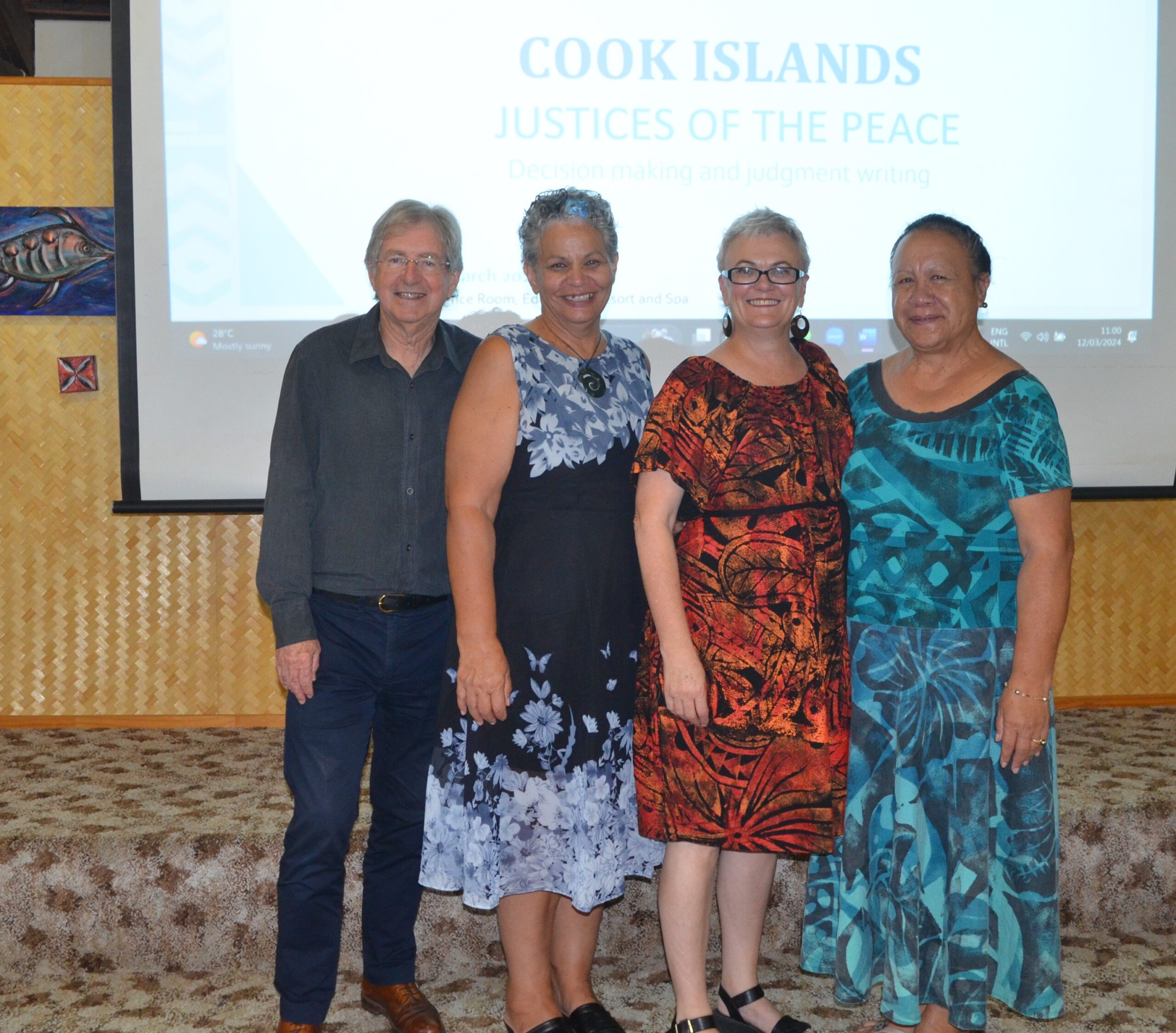Training boosts Cook Islands’ access to justice
Friday 15 March 2024 | Written by Melina Etches | Published in Court, Education, Local, National

The Pacific Justice Sector Programme (PJSP) programme is being delivered by retired Judge from Aotearoa New Zealand, John Adams (left), PJSP staff Delwyn Te Moni and Tina Pope, and local senior JP Tangianau Taoro. MELINA ETCHES/24031206
The Pacific Justice Sector Programme is providing training and resources to the Cook Islands to improve access to justice, including a new Bench Book for JPs, a Case Tracking System, and a Land Court Bench Book in development.
The Pacific Justice Sector Programme (PJSP) that supports access to justice across 15 countries in the Pacific will today complete its first week of training focused on decision making and judgement writing for 12 of the Cook Islands Justices of the Peace (JPs).
Tina Pope from Te Kura Kaiwhakawā/Institute of Judicial Studies in Aotearoa New Zealand, the principal advisor for PJSP, said the Cook Islands is the first to pilot the programme.
PJSP provides support across a range of justice activities including judicial education, judges, judicial officers (like JPs) as well as tools of support.
A new up-to-date Bench Book – a comprehensive guide for judges and judicial officers – has been published by PJSP for the High Court which will provide support for the JPs. It covers a range of their activities and has a checklist and templates providing a good format for a decision that judges and judicial officers can use to structure their decisions.
Pope said that the programme is a very hands-on practical course that involves practice using a whole range of scenarios, using the template, following the format, delivering decisions and receiving feedback and ultimately strengthening quality decision making.
“It’s developing skills you can apply elsewhere, it’s really great,” she said.
In April 2022, with the assistance of the PJSP, Te Tango Tutara o te Ture/Ministry of Justice launched a new Case Tracking System (CTS) to improve management of its court cases.
This new system replaced an outdated system that relied primarily on a patchwork of excel spreadsheets and antiquated applications, modernising its court case management, which will allow for greater reporting, tracking, analysis, monitoring, and scheduling of court cases.
Pope explained that the CTS provides court performance management support – looking at the data that comes out of the case tracking system to see what the delays are and where they are.
“It really informs the court leaders and judicial leaders what’s happening in the courts. We provide technical support back – regular monthly dashboards get released which show the data and there is the opportunity to talk through that, identify what any issues are and what to do about it.”
Understanding that most of the cases are land cases, Pope said that they are currently writing a Land Court Bench Book and are putting quite a bit of support around the land jurisdiction.
Staff from Te Tango Tutara o te Ture land registry will be travelling to Aotearoa in May for a study tour of the Māori Land Court. Training will also be provided here by staff from Aotearoa who will be coming to Rarotonga to work with the local registry employees.
When the course is completed, Pope hopes to see the Justices of the Peace have more confidence.
Pope said that the JPs’ role is a community role.
She expressed that JPs give fair and reasoned decisions so that people understand the basis of the decision, that it follows the law, that they’ve been heard and understood, and that clearly irrelevant factors aren’t taken into account – only relevant factors on the evidence, according to the law.
Retired New Zealand judge John Adams, Delwyn Te Moni, PJSP education and development advisor, and local senior JP Tangianau Taoro are also facilitating the PJSP.
The team is also hoping to meet community groups like the Disability Council to talk about access to justice issues.
“Our focus is on supporting the court, the judiciary to ensure access to justice for all,” said Pope.
The team will also be visiting Aitutaki to see the court there as well as the three-panel judge JPs.
Next Monday, a week’s training will start for new JPs that have been appointed.














































